MAJOR FEATURE
Addressing the problem
The passing and incoming Federal Governments have spoken of additional support for pensioners wishing to work more hours without being financially penalised.
While it’s actually illegal to discriminate against age, many roles are not filled due to ageism and stereotyping. The 2021 AHRI/Human Rights Employing Older Australians report found 25% of businesses don’t have age diversity practises, despite this group bringing greater experience and stability.
“We see mature age workers as being one way we can employ Australians and fill some of the gaps,” says AHA CEO Stephen Ferguson. “For some time, we have received reports of mature Australians who are ready, willing and able to complete a few extra shifts in local hospitality venues but are financially deterred from doing so.”
The existing regulations for mature workers doesn’t offer much in the way of concessions for part-time work, and although this was mooted by the outgoing government is has not yet been put in place.
“Increasing the flexibility of the age pension system will help those who wish to move between work and the pension without facing unnecessary financial penalties.”
In the arena of skilled professions, particularly chefs and cooks, Ferguson says it’s a tougher problem, made worse by the fact processing of visas takes five to ten months.
When the first shutdown hit, the AHA expressed it was strongly opposed to skilled workers being sent home and that they should be put on JobKeeper, to keep them here.
“They didn’t, and we’re now suffering the consequences, and having to go into a global skills race to try to get these people back,” says Ferguson. “We’re competing with the UK, US, Canada, New Zealand … they’re all doing the same thing: visa concessions to make it more attractive.”
AVC has taken the initiative and gone to the source, or sources, running a big offshore campaign in the likes of the UK, the sub-continent, taking in India, Pakistan and Bangladesh, and even in the middle east. So far this has netted around 160 chefs, and around 70 of these have now made it into the country.
The group reports the new pathway to permanent residency for cooks and chefs is making Australia attractive.
The Hospitality Industry Labour Agreement outlines requirements for employers interested in the new passage to citizenship.
What's being done?
There are services directly relating to hospitality employment arising at the Federal level and in most states.
The Australian Government is providing support to all eligible employers who engage a new Australian apprentice. The Boosting Apprenticeship Commencements wage subsidy supports businesses to take on new apprentices and trainees, to build a pipeline of skilled workers.
MAJOR FEATURE
Priority occupations include chef, pastry chef and cook.
Any business that engages an apprentice before 30 June 2022 can be eligible for a subsidy of 50% of wages paid for 12 months, up to $7k per quarter. Beyond the first year, employers will be eligible to transition to the time-limited Completing Apprenticeship Commencements (CAC) wage subsidy for the second and third years of the apprenticeship.
From 1 July 2022, the Australian Apprenticeships Incentive System will provide broad support through wage subsidies for eligible employers in priority occupations. Employers claiming incentives for an apprentice or trainee who commenced before 1 July will continue to be supported.
More information:
Tourism and Sport Minister Senator Don Farrell , as part of the new Albanese government, has already committed $10 million over two years to the hospitality and accommodation industries, for training and upskilling existing hospitality workers and helping attract new workers.
Recruitment service Employee matters has produced a collection of videos addressing issues with hospitality and things to consider.
Hiring Mature Workers looks at incentives to hire over 50s, noting the restart wage subsidy for mature workers of up to $10k, to encourage businesses to hire and retain.
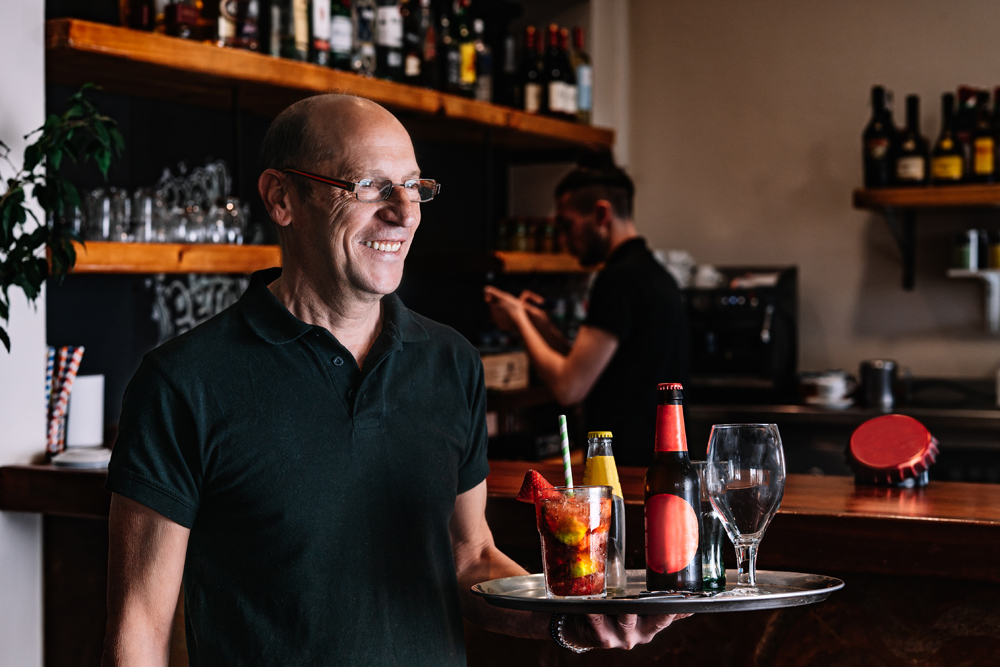
Don’t assume you know
Every workforce and workplace culture are different, so survey your own team to ensure you’re working with real data. Understanding your staff can provide a lot of insights.
Questions for your surveys might include variations on these basic examples:
Do you have what you need to perform well in your role?
Have you been promised something that has not been provided/delivered?
Do you feel suitably appreciated when you do good work?
Are there new responsibilities you would like to try?
Should your role be changed in some way?
What is the biggest challenge you are facing, at work or beyond?
Employee Matters Natasha Hawker discusses some of the incentives and advantages of hiring mature-age workers, including the government’s Restart wage subsidy of up to $10k for businesses.
In People With Disabilities Hawker looks at what employers need to know about this practise.
Mental Health is an issue for around 50% of hospitality workers. The broad label includes: depression, anxiety, worry, sleep problems and fatigue – all of which affect a person’s ability to function well.

MAJOR FEATURE
Global drinks giant Diageo has produced a tutorial with tips on hiring and retaining staff, including training to ensure staff are supported, on maintaining loyalty, and how to successfully retain positions. The video is presented by Madeleine Geach, head of culture at Hawksmoor, and World Class winner and bar owner Laura Newman.
Hospitality specialist Quantaco (previously PKF) has produced Salesline, allowing operators to forecast sales in 15-minute increments, making it possible to correctly assign staff during peak hours and track real-time sales.
Quantaco CCO Scott Barber suggests Salesline will make it easier to monitor business performance and other relevant benchmarks.
“With such a short supply of labour, it’s never been more important for venues to be able to effectively roster and manage their staff. That’s where Salesline can really help.”
Another time-saving program developed by Quantaco is Cashup, which provides a more efficient solution to spreadsheets and end-of-day accounting. It automates daily sales and easily identifies errors when accounting for the day’s takings.
Industry strategies
Speaking to pub operators around the country, there is an impressive mix of solutions being tried and applied, influenced by group size, location and circumstance.
Australia’s biggest pub operator, Australia Leisure & Hospitality (ALH) – the hotels arm of the listed Endeavour Group (ASX:EDG) – says the company is still struggling to find workers. It has earmarked $40-60 million, much of which will go on its hotels, to be spent over the next 12 months on a digital and data “transformation”.
As a well-backed corporate player, AVC has been able to put a fair percentage of venue managers and head chefs on four-day working weeks – purely as a retention strategy. This is particularly challenging when an organisation is already down on staff, but Waterson believes unless the cycle is broken a business can end up in a death spiral where turnover rate increases further.
MAJOR FEATURE
“We’re lucky we have great recruitment resources and we can afford to do things like go overseas and get large volumes of workers, but you equally have to address turnover on the other end to make sure there’s not bleeding of people out the bottom of the bucket.”
Responding to its greatest deficit, AVC is focusing heavily on its internal progression program, bringing existing employees up to speed to take on key roles. This is found to be successful, in part because the upskillers understand the culture and the requirements and how the business is run.
“We’re putting a lot more focus on training and development for those people, and trying to recruit for those more senior roles internally,” continues Waterson.
“To be honest, we’re probably putting some people into those roles earlier than we may have done a couple of years ago, but you just have to put more support around them to make sure they’re successful.”
Hunt Hospitality offers that the group is “incredibly proud of the effort of all our teams”. HH has been actively overcoming staffing issues by creating a positive working environment and culture.
This takes in initiatives such as developing a roster to facilitate a four-day work week for full-time employees, and investing time into effective staff incentives, including creating bonuses based on KPIs.
There is also Hunt Hospitality's Employee Assistance Program, which encourages staff to utilise the three free sessions offered with a qualified psychologist, which can be claimed anonymously if desired.
Sydney-based Odd Culture Group says its focus on employees has defined it, resulting in the creation of the ‘People and Odd Culture
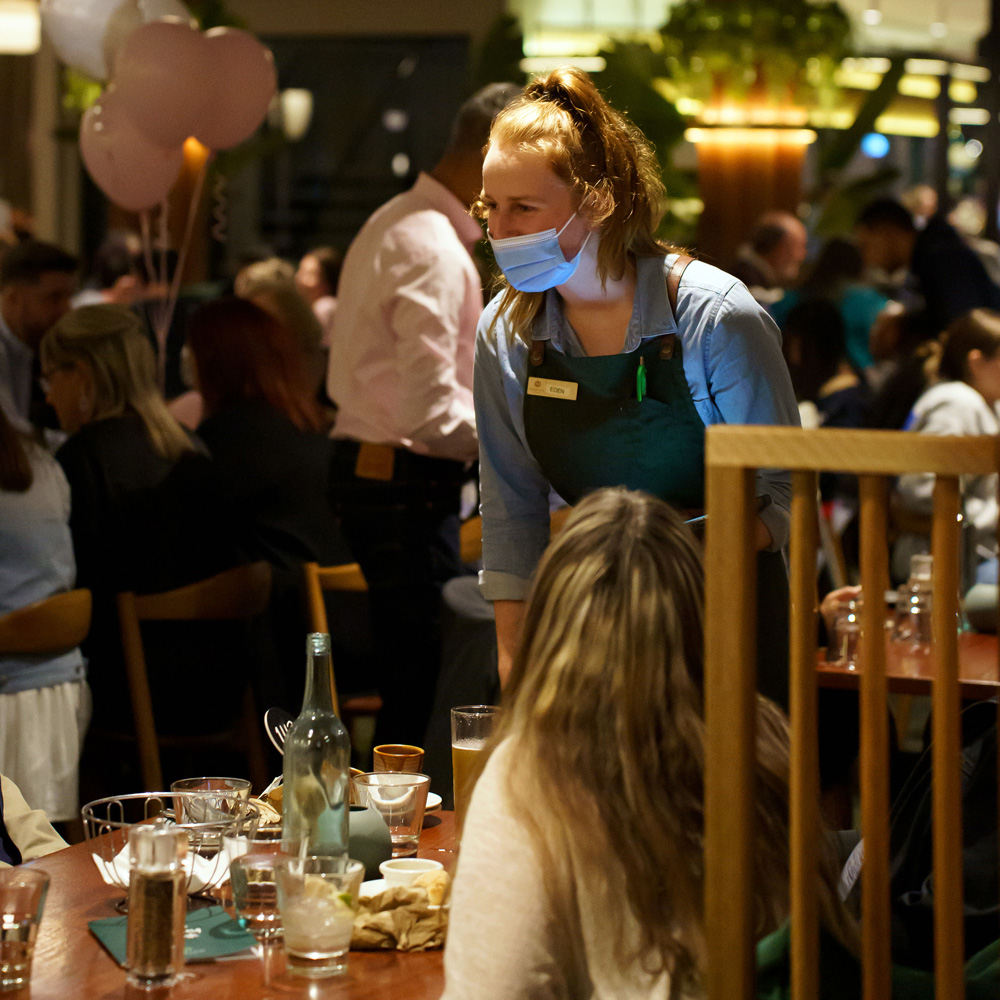
Program’ in late 2021 as a way of formalising its commitment to sustainable hospitality, training, mentorship and growth for all full-time employees.
The program puts hard caps on service hours, and makes time for intra-venue mentorship, personal development, and nationally recognised training. It also provides each staff member a solid path for progression within the company.
“Our mission is to be the best hospitality company in Australia, and it’s incredibly important to me to be on this journey with the most talented and interesting people,” furthers principal, James Thorpe.
“We will continue to invest all the money we make back into our staff and venues to make the group the very best it can be.”
Lewis Land has been famously proactive in its employee enticements, highlighted with the lottery for all new and existing staffers giving away two brand new cars. But the quest continues.
“We have adopted the approach to never stop hiring and currently we offer traineeships and pay above award,” relays a spokesperson. “We promote a healthy work-life balance, with maximum 45-hour work weeks for salaried employees, and we offer a probation bonus of $2,500 for chefs.”
Sand Hill Road continues the initiatives it has employed on staff for years, but warns hospitality will need a lot of support by government to improve access to overseas workers.
“So many of our previous staff went home and can’t afford to come back,” explains Mullins. “That’s not going to be solved immediately.”
Continued development and training are seen as key to happy, loyal and long-term staff, and a history of doing so bolsters the impression in the minds of those in demand.
“We’ve certainly found the work we’ve done over 20 years to look after staff – and not just saying it but actually doing it – really helped us get through COVID, with staff retention.
“We’re not the biggest in the country, nor wanted to be, but have always pushed that mantle of wanting to look after our people the best.”
SHR regularly surveys all staff, and finds feedback has largely been that workers simply want to get back to work and stay at work. Beyond the surveys, there is a 24/7 facility for feedback that goes straight to the CEO, which can be sent anonymously. Mullins believes these systems are well utilised by staff because they see action based off their feedback.
The group also champions a monthly awards called The Sandys, and an amazing three to four thousand nominations are received each month by staff, recognising peers for great behaviour and work.
“Listening to staff is right up there for us,” stresses Mullins. “These are the people that can literally feel the pulse of our business, and you have to get their insights and intelligence – and act on it.
MAJOR FEATURE
“We’ve recognised for a long time there was a big hole in the career path development in hospitality, so we didn’t wait for government or other to fill that hole, we’ve been doing that for 20 years – the last five years in a really sophisticated way.
“We are focussing on hiring good people with the right attitude. There are very few applicants with experience, so we are happy to hire those with a good attitude and train them up. We have become more creative with our hiring and rostering, for example approaching local schools to recruit glassies and school leavers.
“With that, we’re also investing a lot in training with a dedicated training manager, knowing a lot of our team members will have very little experience. It’s been a huge asset to improving our service.”
What’s being done to overcome?
Iris Group has demonstrated a rapid and impressive expansion in the past decade, to become a portfolio worth more than a billion dollars. Growth over the years has commonly relied on starting with a base venue in a new area, and acquiring others nearby to build economies of scale in purchasing and resources. This practise has assisted with staffing shortfalls, by allowing more staff exchange between proximate venues.
“In the short-term I’m able to lean on the resources I already have,” explains Devine. “The network always exists with people; it’s about using the network you have.
“I encourage our current staff to become recruiters, and we give them a cash bonus. It makes them happy, building people around them they know and adding to their network.
“But I find myself asking: where is the pathway to get into hospitality?
“Where I grew up the mindset is different, you literally would not walk in and work in the bar, you maybe got a job in the cellar, you did your time – two years, like a trade, paid at the same rate as a plumber or chippie. You qualified to become a bartender, then you could go anywhere.”
Marcello Colosimo’s Momento Group has proven to be highly proactive and innovative throughout the pandemic, famously opening a very successful drive-through service vending meals, drinks, groceries and vast amounts of pre-batch cocktails out of its bottleshop at Bella Vista.
Momento has put in place a strategic hiring system, storing and tracking applicants, and mapping career pathways. Mentorship programs teach leadership, greater personal accountability, and emotional safety in the workplace.
“There’s a need like there’s never been before,” says director Jason Jelicich, who believes industry professionals are in the driver’s seat in this environment.
“As an experienced hospitality manager, this is the time to make some moves and make some money.”
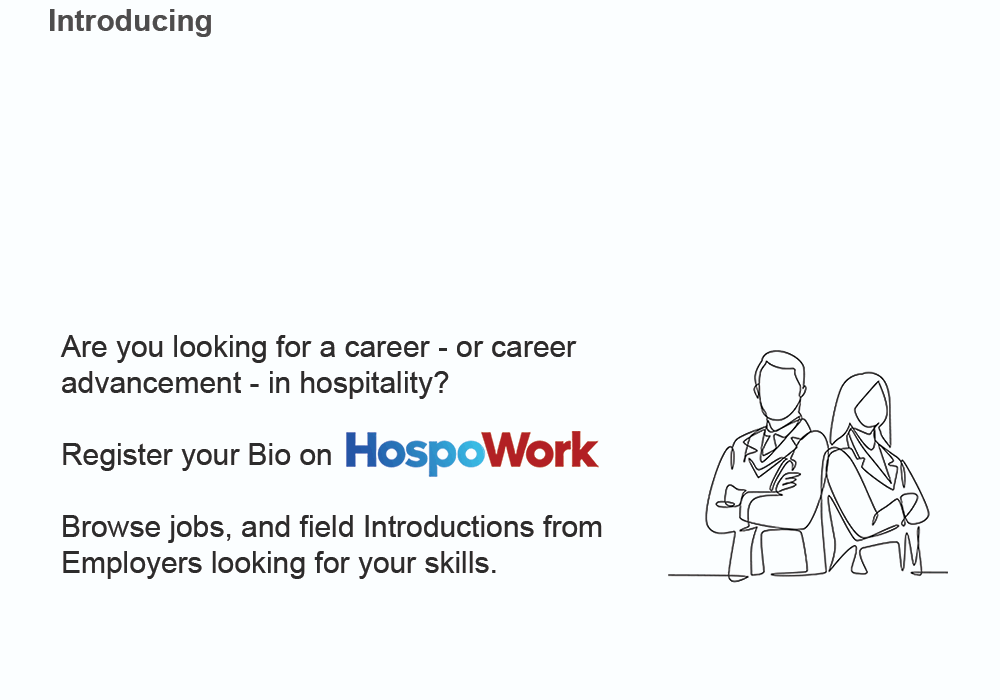
MAJOR FEATURE
Research has found around 85% of hospitality workers don’t see a career path in the industry, but an increasing number of operators are seeing the value in painting the picture for key staff, some to the point of helping fund them into their first venue, as a share partner.
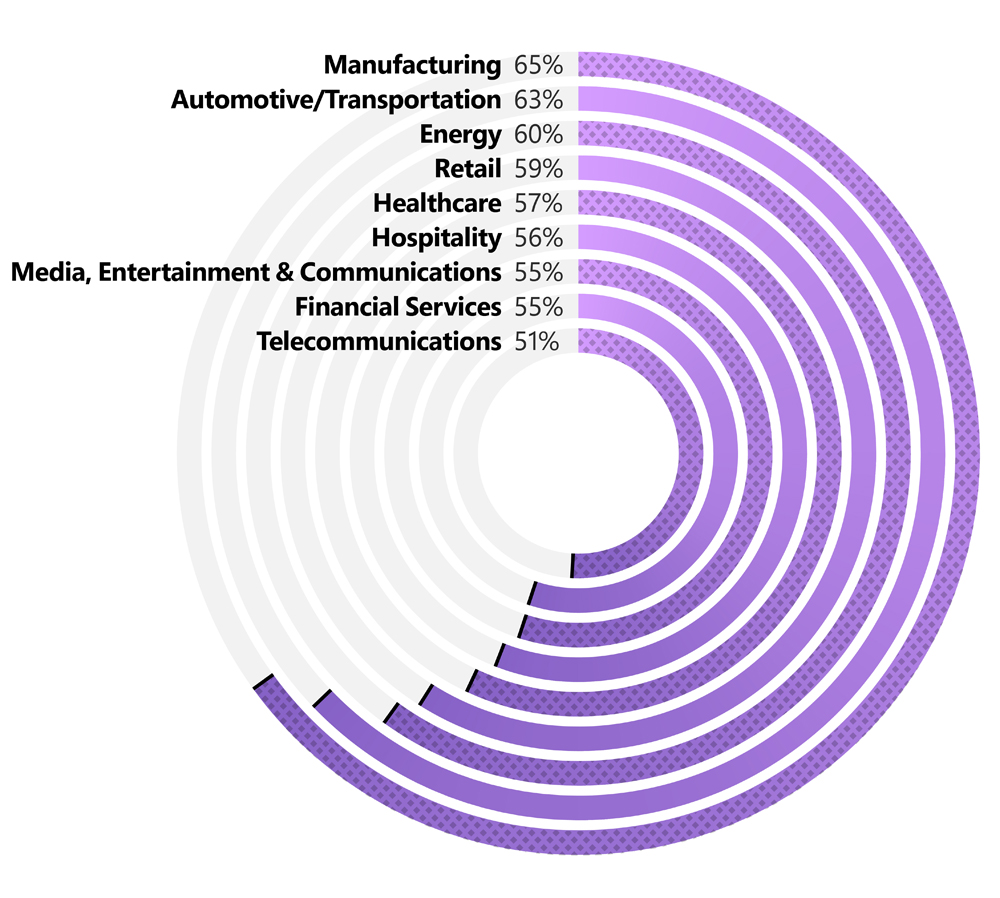
Workers that believe their stress will increase in 2022, by industry
“The glass ceiling’s been so thick and so low for so long it’s stymied a lot of people from staying in the industry,” furthers Jelicich. “That’s what’s in it at managerial level. You’re already doing long hours every week, it would be better if it was for your dime, having equity stake in your own place.
Consider, as an Employer …
How much can you realistically deliver, with a sub-optimum team?
Analyse and quantify what each role should be producing, and extrapolate to see can be done with what you have, to make this happen consistently. Performance can be benchmarked by actual results to fine-tune your expectations, and booking and capacity limits gauged accordingly.
Define what you represent as an employer
Providing a clear outline of what employment with you means, such as a mission statement or list of standards, can help differentiate you from other employers and assist in-demand candidates in determining who to choose.
Another step in the clarity is to define the KPIs of roles, and reward performance exceeding them. If unsure how to set KPIs the best approach is to ask the staff themselves, or try this article by CMS Hospitality.
It is suggested the best incentives for hospitality workers are experiences and objects, as they can be appreciated physically, and will always be associated with the giver.
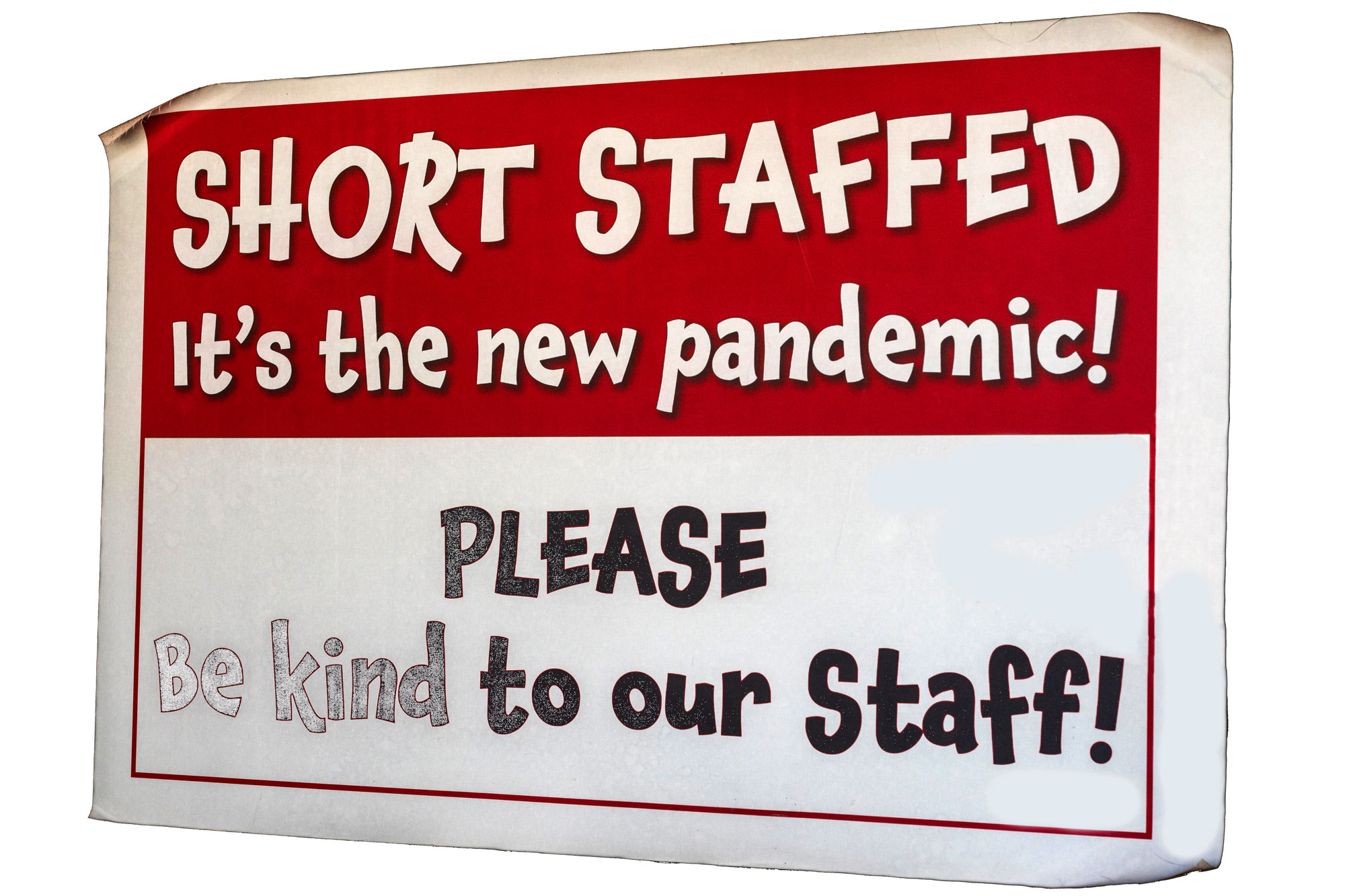
Tips for Job ads
Ways to help your job ads get more attention include:
Get clever and creative with job ad titles and text
Come up with new ways to describe the role in a way that makes people click (eg. Mixologist vs Bartender)
Post ads across more than one job type category. This could attract very different types of applicants that may all be suitable for the role, such as an inexperienced junior you can train, an experienced person who can at some point in the future, or someone with comparable qualifications in a different sector
Paint a realistic picture, but discuss all the best parts of the job while highlighting the challenges. Most productive staff love a challenge!
“The squeeze is probably going to expedite employers to give people an aspirational career path, but also to really clearly define: if you start with us, here’s the road map to becoming a leader or even an owner.”
What have we learned?
First coined in the US, the phenomena of the “Great Resignation” in Australia is shaping up to be more about job-hopping than people leaving the workforce, and a lot of this can be attributed to unusually low levels of employee turnover throughout the pandemic in most industries.
Australia actually experienced the lowest employee turnover during the crisis since the ABS began tracking labour mobility. The number of workers changing jobs reached 17.4% in 1972. By comparison, the year following the start of the pandemic recorded only 7.5%.
In terms of rebound, the number of workers changing jobs in Q4 last year was up 26% against the same period in 2019.
Tech giant Microsoft shared its Work Trend Index Special Report on Frontline Workers, offering insights and guidance to aid businesses navigate the changing workplace. It is based in a global survey of 9,600 frontline workers in eight industries
MAJOR FEATURE
(including hospitality, retail and health), across eight countries (including Australia), conducted in Oct/Nov 2021.
Key research findings were:
Frontline workers cite better pay, work-life balance, benefits and flexibility as top reasons for considering a job change
A culture of caring is the new currency on the frontline: 84% of Australian workers (76% globally) feel bonded to each other, yet over 74% (60% globally) say the company should better prioritise culture and communication
52% of those in non-management positions on Australia’s front line don’t feel valued as employees
Technology to be part of the solution in helping ease the burden on essential workers. Organizations should reimagine how frontline workers operate and connect – with both customers and each other – to more confidently navigate the COVID era
Digital tools include reservation and messaging systems, food delivery apps, and capacity and supply chain software
Microsoft suggests as more frontline workers rethink the role work plays in their lives organizations have an opportunity to create an operating model and culture that attracts the best managers and employees, by promoting employee collaboration and connection, and enhancing productivity.
Industry insights
The AHA counts 5,000 members, employing 250k people, and insists government must appreciate the contribution of the hotel sector to the economy.
“We’re a big industry, employing a lot of people, and we need to be heard,” says Ferguson.
Hospitality heartland Victoria is rapidly adjusting to the new normal, but remains diligent.
“We’re not out of it yet, there’s a long road ahead, but we’re certainly more confident than ever that we just really need to get those roles back from overseas that were told to leave the country,” concludes Mullins.
“The restrictions put on hospitality workers were amongst the cruellest and long-serving as any. It’s extraordinary that so many hung on for so long, the way they’ve been treated so harshly at the workspace.
“I don’t think the industry was asleep. I don’t think we had any idea the entire country – the world – was going to be shut down by this. That just wasn’t even on the radar. I think if it’s taught us anything it’s that these things can happen, so do invest in the career paths, do invest in safe work spaces.
“As hospitality workers develop confidence in it being a workplace that’s fun again, and not restrictive like that, the recovery will continue.”
Sentiment in the other southern state follows suit.
“We need to now show staff that hospitality can provide stable, long-term, flexible and fulfilling employment,” offers Anna Hurley.
National player Iris sees the industry’s problems solved by: education, build the local workforce, fill the gap with foreign labour – but some public relations needs to be done as well.
“You’ve got signs everywhere at the moment saying ‘please be patient – at least our staff showed up’. This is not a message to
an industry or young kid that will make them want to work there,” observes Devine.
“We’re not telling the story of hospitality. We need to start putting the love back into the industry and promoting it. You can promote the customer, everyone has said ‘get back to the pub’, but no point if the pub can’t be staffed.
“A responsibility lies with large players, in line with the industry body, to actually promote the benefits of working in hospitality. We missed an opportunity after the first pandemic to get behind the industry and get back into the education space. We needed to do that, and we still haven’t done it.
“The message should be it is a good stepping-stone job; it helps you study, get your first car – it helps you. It’s the greatest industry in the world for helping people. But for anyone who wants more than just the casual help, it is a great career. A fantastic career! A career that can be used anywhere in the world.
“I have worked in Dublin, France, Germany, USA, Australia. I spent three years travelling with Royal Caribbean. I got to see the world and I’ve met a lot of people from a lot of different countries.
“It opens up doors.”
In the wake of diminishing returns on job ads and traditional employment channels, the future seems to lie in specialised industry approaches and thinking outside the square, sees AVC.
“There are ways through this,” bodes Waterson. “You just have to be innovative, resourceful and try things you otherwise wouldn’t have tried.
“I think there’s going to be some really good things come out of this, like there is any time when people have to be innovative.”
